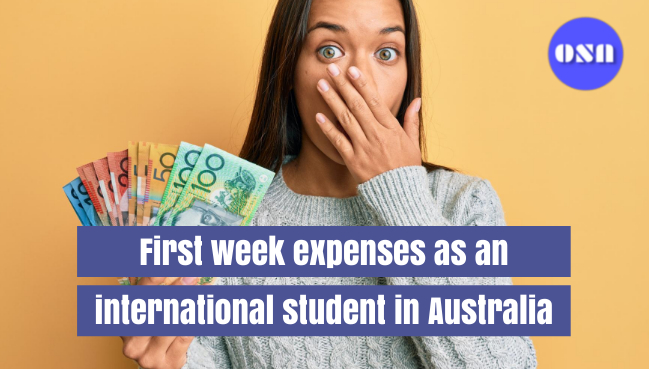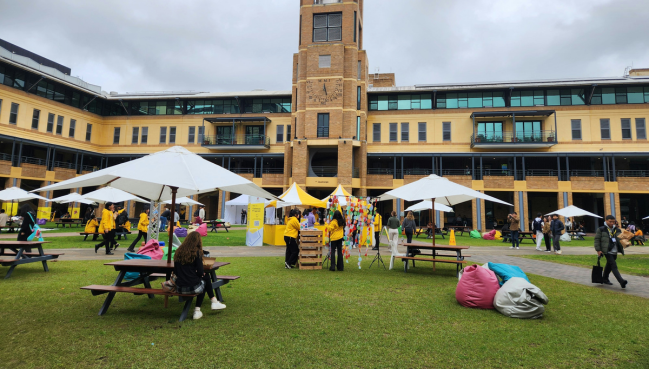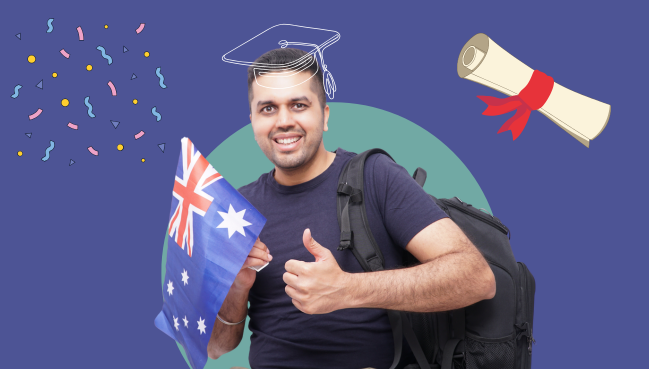First week expenses in Australia as an international student

We often get asked about the first week expenses in Australia that international students should budget before arriving to study here.
Now, your first week’s expenses as an international student in Australia will vary depending on the city you’re moving to, the type of accommodation you’ll be staying in, and your lifestyle.
In this article, we will provide a rough estimate of how much you will need to pay for these expenses.
1. Airport Transfer
First thing first, you would need to go to your accommodation from the airport.
You can use various types of airport transfer options like public transport, charter buses, airport buses, taxis and ride sharing services like Uber.
There may be a free airport pickup service offered by the university or institution you will be attending. Make sure you verify that with your university or institution.
For public transport transfers, it can cost around $10 to $25. You can also use private buses like Sky Bus which can cost around $30 or alternatively you can also use a taxi service or a ride-sharing service like Uber, Ola, or Didi. You will be paying anywhere from $20 to $200 for these services depending on the distance you need to travel.
If you have friends or family that can pick you up at the airport, that would be great as it would help you save money for the airport transfer..
2. Accommodation
Many international students coming into Australia will be booking temporary accommodation at the start.
It could be a hotel, an Airbnb, or a hostel, and during that time you should be prepared to pay between $250 and $400 for the week.
However, if you have made arrangements to stay in long-term accommodation, you will be expected to pay at least a two-week bond, which is a security deposit and is refundable at the end of your tenancy. You would also be required to pay one month’s rent.
If you have friends or family who you will be staying with in Australia, that would be awesome as it can help you save money and share the accommodation expenses. You could be paying anywhere from $150 to $300 per week for the shared accommodation.
3. Mobile SIM and Internet
You should be able to get a prepaid SIM when you first arrive in Australia. Prepaid SIMs cost between $15 and $30 a month.
They come with unlimited calling within Australia and a lot of data that can help you access the internet. Some of the sims also come with free international calling to certain countries as well.
For the internet, you can also ask your accommodation provider if they provide these services as a part of the accommodation. Sometimes they might require you to pay extra fees for using these internet services.
Good home internet plans start from around $50 per month. But you can share these expenses if you are living in shared accommodation.
4. Transport Expenses
Most of the states and territories you will be coming into have specific transport cards that you need to use for travelling on public transport.
It is completely free in some states or directories, but most of the time you will be required to pay $5 to $10 to purchase this card.
For example, in Melbourne, they make use of the Myki card, which costs $6.
During your first week, you might also be traveling a lot as you need to visit your university, you might start looking for a job or accommodation or just travelling to see around the area.
So you might be spending $20 to $50 for your first week of travel, and this varies based on the city you’re coming into and how many times you use public transport.
5. Food Expenses
If your accommodation provides you with facilities where you can cook food then we highly recommend that you cook your own meals as it is a cheaper option than eating out.
You will also need to buy groceries and that can cost you around $80 to $150 for your first week, and it varies based on what you intend to cook and how much you know about cooking.
If you are going to be eating out, especially lunch and dinner, it can be an expensive affair in Australia.
Even if you stay on budget. you will still be spending about $20 to $30 per day if you eat out most of the meals.
Food delivery services like Uber Eats are also very popular in Australia but it can be an expensive exercise as well.
You can check out our blog post that walks you through what you can eat under $10 in Melbourne Australia here and more blogs of other cities are coming soon. So make sure to follow us on Instagram for updates here.
6. Study Material Expenses
Each semester, you might need to buy some new books.
You can start with secondhand books or books available from the previous students, as this will obviously be much cheaper.
But you will be expected to pay between $50 and $100 for each book.
You can borrow some books from the library, however it can be really challenging for everyone to borrow those books at the same time. So you must be quick in getting these books loaned from the library.
Estimated Total First Week Expenses in Australia for International Students
In total, our estimated total cost as your first week expenses in Australia will be around $500 to $1200.
Again keep in mind that these numbers can vary based on the factors like city, lifestyle, accommodation and personal preferences.
Here is a quick summary of how these expenses might look like:
1. Airport transfer fee – Free – $10 to $200
2. Accommodation rent –
- Hotels, Airbnb, Hostels – $250 to $400 per week
- Long term accommodation (Including Bond ( 2 weeks rent + 1 month rent) – $700 to $1000 for the month
- friends and family – Free to $300 per week
3. Mobile sim and internet – Prepaid Sim – $15 to $30
4. Transport
- Transport card – $5 to $10
- Transport Travel cost – $20 to $50
5. Food
- Cooking – $80 to $100,
- Eating out – $20 to $30 per day
6. Books – $50 to $100 per book
7. Total Estimated Cost- $500 to $1200
Other things you need to do in first week
Here are some things you also need to do in your first week that don’t require spending money:
- Opening your bank account
- Applying For TFN
- Applying For ABN
- Creating your Resume
- Orientation at your school
We have several videos on our YouTube channel that can walk you through some of these things you need to do in your student life.


